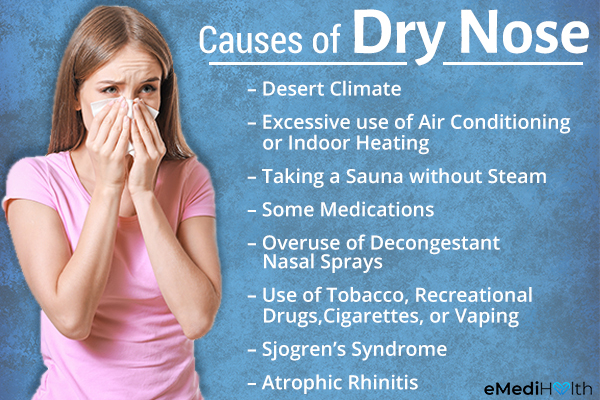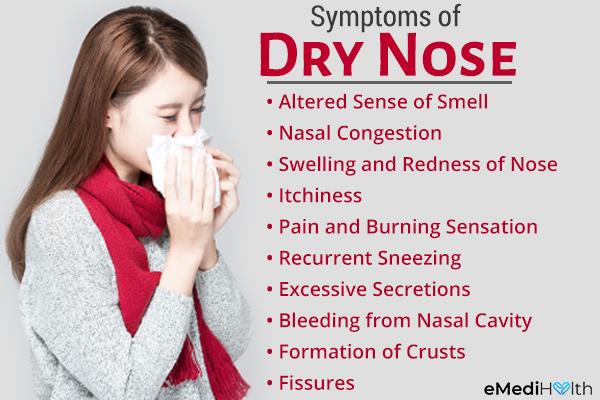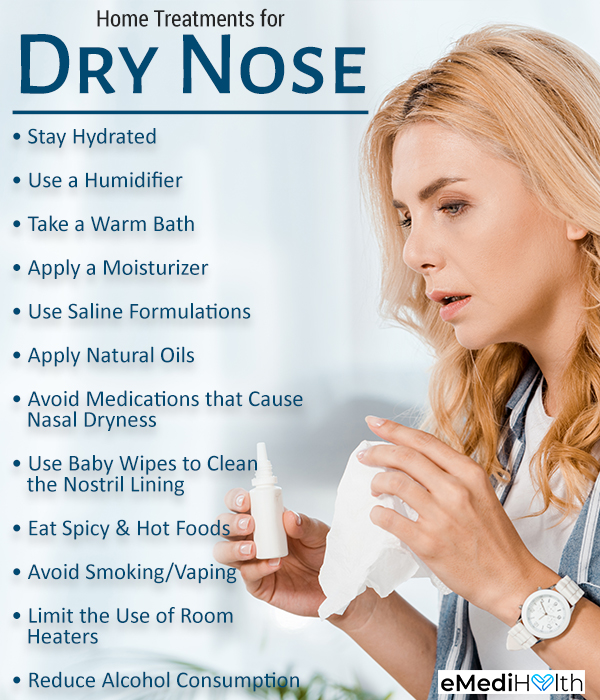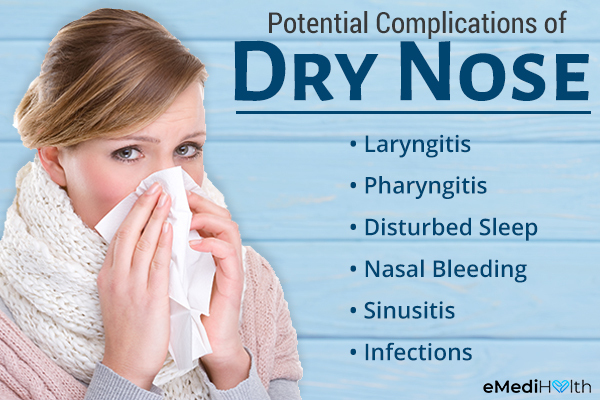In this article:
The inner walls of your nasal passage secrete some amount of mucus on a daily basis. This sticky, viscous fluid lubricates the nasal cavity and traps any invading germs, dust, or irritants.

Inadequate production of mucus can render your nose extremely dry and uncomfortable. Moreover, lack of humidity in the environment can further dry out the nasal cavity and turn the mucus into a condensed, crusty mass that blocks the passage of air.
This can make breathing difficult, sometimes forcing you to breathe through the mouth, further dehydrating the mouth and throat.
Contributing Factors for Nasal Dryness

Dryness in the nose commonly occurs due to decreased humidity levels in the surrounding environment. The following factors can contribute to increased dryness:
- Desert climate
- Excessive use of air conditioning or indoor heating
- Taking a sauna without steam
A dry nose can also occur due to:
- Medications such as antihistamines, anticholinergics, and decongestants
- Overuse of decongestant nasal sprays
- Use of tobacco, recreational drugs, cigarettes, or vape
- Sjogren’s syndrome, (1) an autoimmune disease in which the immune system of the body attacks the mucus-secreting cells of the nose, eyes, and mouth, resulting in decreased mucus secretion and, consequently, dryness
- Atrophic rhinitis, a chronic condition with an unknown cause characterized by the formation of thick, dry crusts in the nasal cavity
Symptoms of a Dry Nose

Dryness in the nose may be accompanied by:
- Altered sense of smell (2)
- Nasal congestion (usually in the morning)
- Swelling and redness of the nose
- Itchiness
- Pain and burning sensation
- Recurrent sneezing
- Excessive secretions
- Bleeding from the nasal cavity
- Formation of crusts (2)
- Fissures
Self-Care Treatment for a Dry Nose

Nasal dryness due to changing weather conditions can be treated using these methods:
1. Consume more water
It is important to stay hydrated to prevent drying of the tissues, especially during the cold winter months, even if you do not feel thirsty as usual. Avoid alcoholic beverages and drinks that have a high sugar content to prevent further dehydration.
2. Enhance the humidity
The arid air of the winter season can cause dryness in the nose. A bedroom humidifier can be used to increase the moisture level indoors.
The humidifiers should be cleaned twice a week to avoid the growth of mold and bacteria. Self-sterilizing humidifiers, which let you skip on the hassle of cleaning, are also available.
3. Take warm baths
Steam baths or saunas increase the moisture level in the air and hydrate your skin. The increased humidity during steam baths can help to relieve a dry nose. However, exposure to steam for very long durations should be avoided as it can cause skin dryness.
4. Moisturize regularly
Apply a water-based moisturizer to keep your skin hydrated at all times. Make sure to reapply the moisturizer after washing your skin or if you feel that its effect is wearing out.
You can even use petroleum jelly to moisturize your dried-out nostrils but only in small amounts. If you slather copious amounts of this thick emollient in your nasal cavity, you may inhale it deep into your respiratory tract.
The excess jelly can then trickle into your lungs, giving rise to serious complications such as an abscess. To prevent this, apply a minuscule amount of the petroleum jelly using a cotton swab or your finger and gently rub it in.
5. Use saline sprays
Saline formulations of nasal drops, gels, or sprays help in cleaning the nasal passages and provide additional moisture.
One study revealed that the use of nasal spray brought relief from nasal dryness. (3) However, overusing decongestant nasal sprays can cause unwanted side effects.
6. Apply natural oils
Edible oils can be used to provide relief from a dry nose as they are safe to be used internally. These oils include clarified butter, coconut oil, or almond oil. These oils can be applied to the nasal passages using a cotton swab. If you are sensitive to any oil, avoid its usage.
7. Avoid medications that cause nasal dryness
There is a long list of medicines commonly associated with nasal dryness, including diuretics and medications with significant anticholinergic side effects. Thus, if you are prone to a dry nose, speak with your physician about your medications to avoid triggering or aggravating the condition.
8. Use baby wipes or facial tissues
Moisten a facial tissue with a nasal saline spray and then gently wipe the dry nasal skin with it. Baby wipes can also be used for the same purpose.
9. Eat spicy and hot foods
Spicy and hot foods stimulate mucus secretion and may provide relief from a dry nose.
10. Avoid smoking and vaping
Smoking and vaping aggravate the dryness in your nose and mouth. Non-smokers also need to avoid exposure to secondhand smoke.
11. Limit the use of room heaters
Prolonged use of room heaters can suck the moisture from the air and make your living environment increasingly dry.
12. Reduce alcohol consumption
Limit your intake of alcohol as it acts as a diuretic and can leave your body dehydrated.
If these methods do not relieve your dry nose, seek medical help. It is recommended to pay a visit to the doctor if your dry nose is accompanied by dry eyes and/or dry mouth as it may be symptomatic of an underlying disease.
High Altitudes May Cause a Dry Nose
With an increase in the altitude, the air becomes thinner and drier. Due to the lack of humidity in the atmosphere, the nasal cavity may turn dry, leading to irritation and bleeding.
Are Dry Mouth and Dry Throat Associated With a Dry Nose?
People suffering from a dry nose may also experience dryness in the mouth and throat, especially when they wake up in the morning.
A dry nose can make breathing increasingly difficult and thereby reduce the oxygen supply to the rest of the body. To prevent this, you inadvertently start breathing through the mouth. The dry air that passes through your mouth and throat makes these areas dry or parched as well.
Why Is Dry Nose Recurrent in the Winter?
Due to the low levels of humidity in the environment during winter, the mucous membranes start drying up. The use of room heaters further strips away the moisture from the air. These factors can lead to a dry nose, which can also make you increasingly susceptible to viral infections.
Chemotherapy-Related Nasal Dryness
Chemotherapy is known to cause loss of hair from the head. It also causes shedding of nasal hair, otherwise known as cilia.
Due to the lack of hair in the nasal cavity, the mucus layer cannot be regulated. As a result, the nose becomes sore and dry. The incidence of nosebleeds also increases. (4)(5)
Possible Complications of Nasal Dryness

Persistent dryness in the nose may be a symptom of a serious health issue. In such a case, it is necessary to undergo proper treatment.
Delaying the treatment may increase the risk of complications such as:
- Laryngitis: A dry nose can cause inflammation in the larynx (voice box).
- Pharyngitis: Insufficient mucus production causes soreness in the throat, leading to irritation and inflammation of the pharynx.
- Disturbed sleep: A dry nose can cause respiratory discomfort and irritation, which can affect your sleep.
- Nasal bleeding: A persistent dry nose may lead to nosebleeds.
- Sinusitis: Due to the lack of mucus secretions, you may experience discomfort, facial pain, and congestion.
- Infections: Viral or bacterial infections in the nose and other parts of the respiratory tract become common, as a dry nose is unable to trap the microbes and prevent them from entering the body.
When to See a Doctor
It is advised to seek medical help if your dry nose is accompanied by other health complications such as nosebleeds or extreme pain and discomfort.
A persistently dry nose could be symptomatic of severe medical conditions such as Sjogren’s syndrome and atrophic rhinitis.
Final Word
Discomforting as it may be, nasal dryness is generally not a serious health concern that requires medical treatment. Simple self-care measures aimed to hydrate the skin and body should suffice to relieve the problem.
However, if left untreated, nasal dryness can pave the way for infections, severe headache, or a sinus attack. If your condition fails to improve despite home treatment, consult your doctor to rule out any serious underlying condition.
Moreover, if your nasal dryness is a side effect of medication, ask your doctor to prescribe a more suitable alternative.
- Was this article helpful?
- YES, THANKS!NOT REALLY


